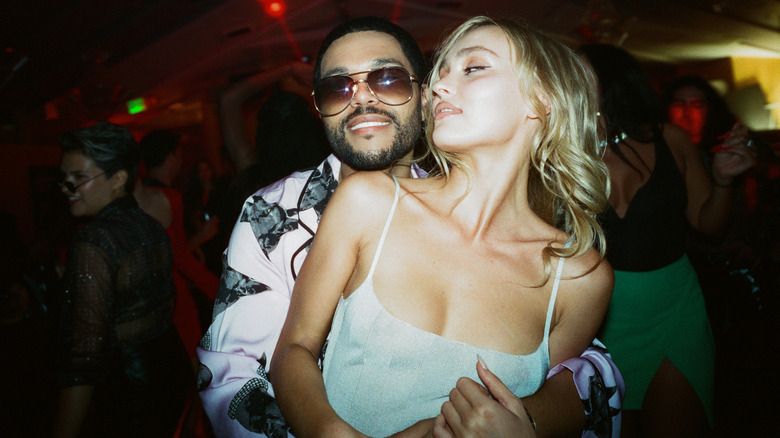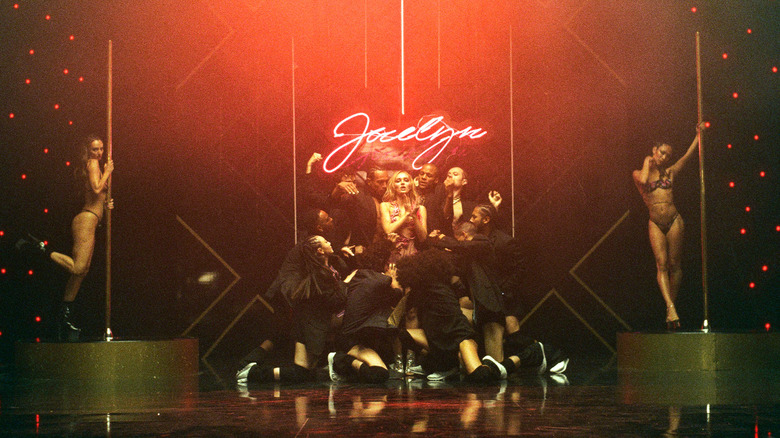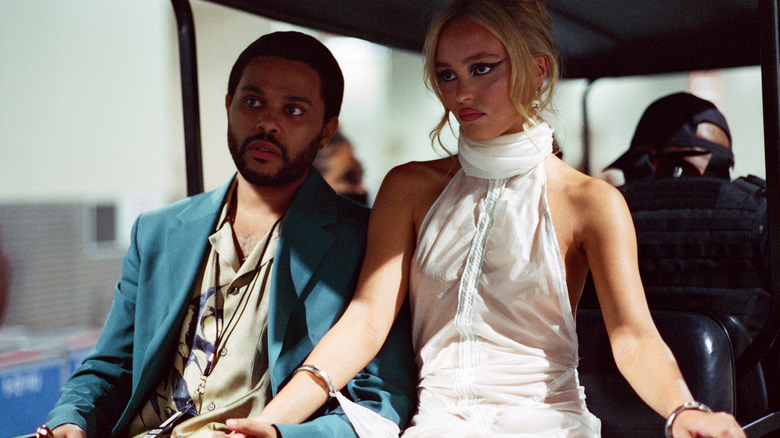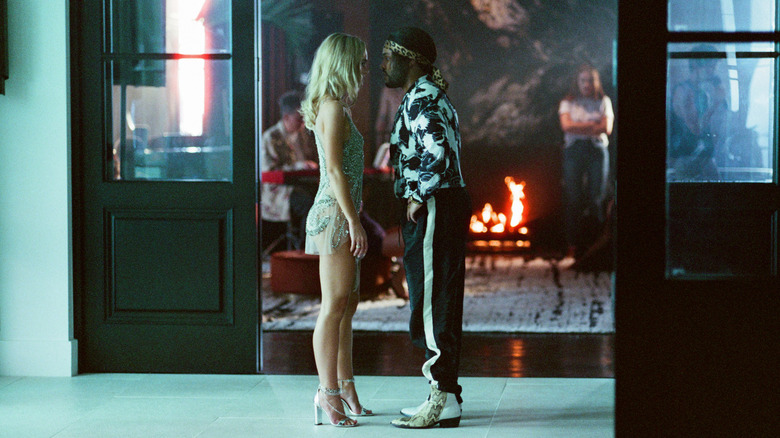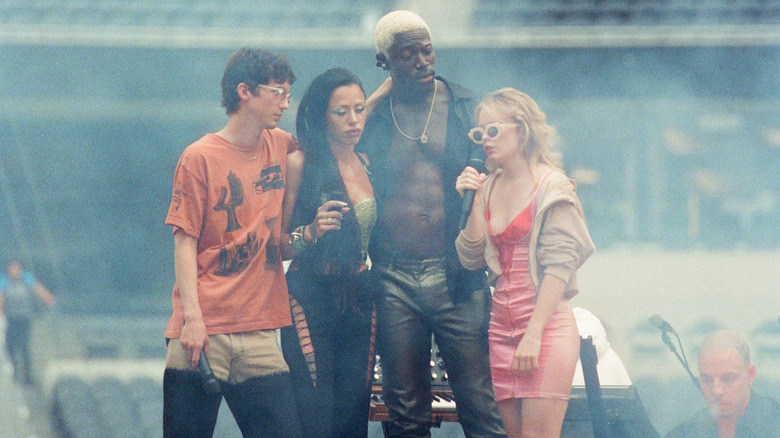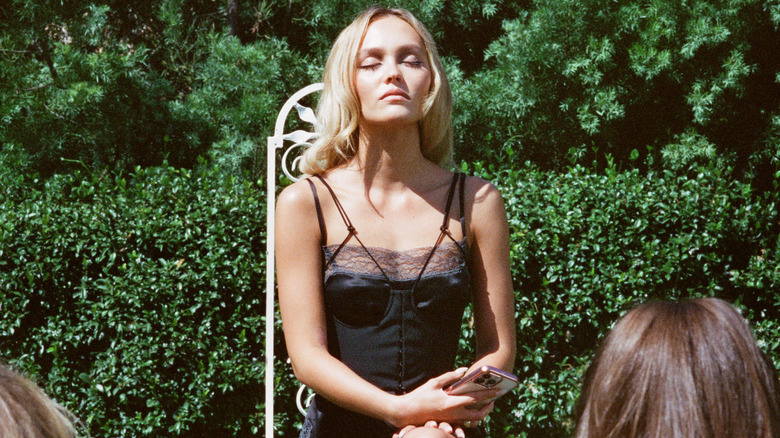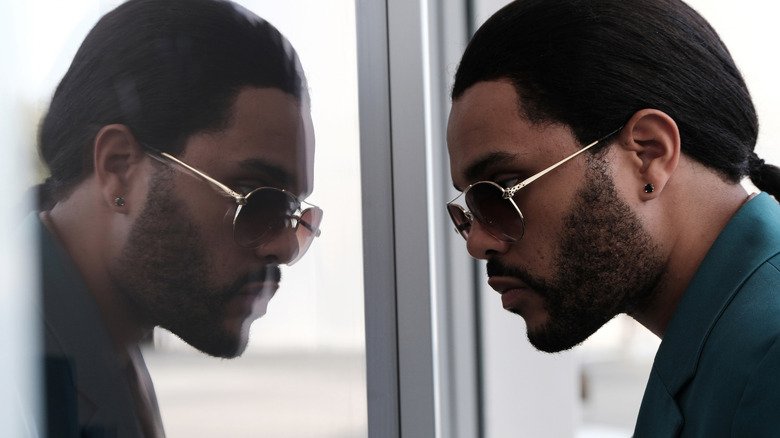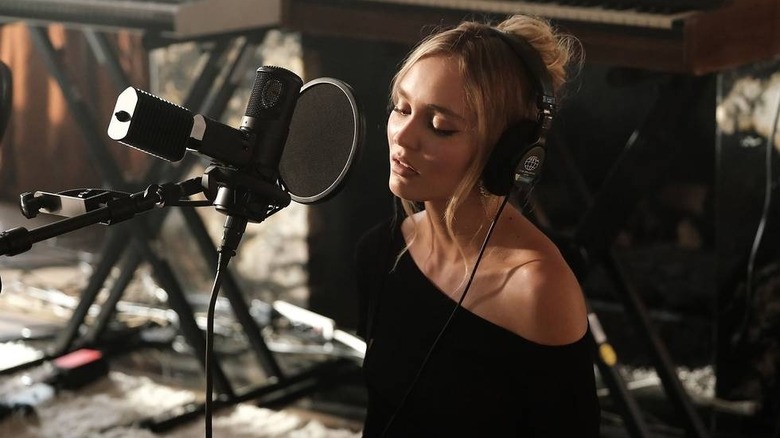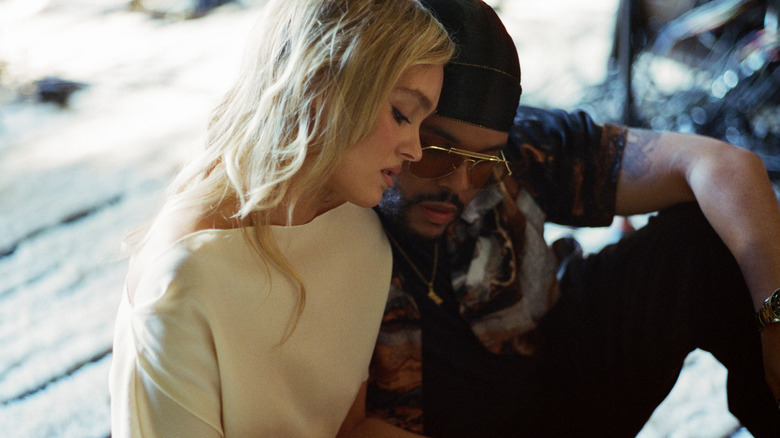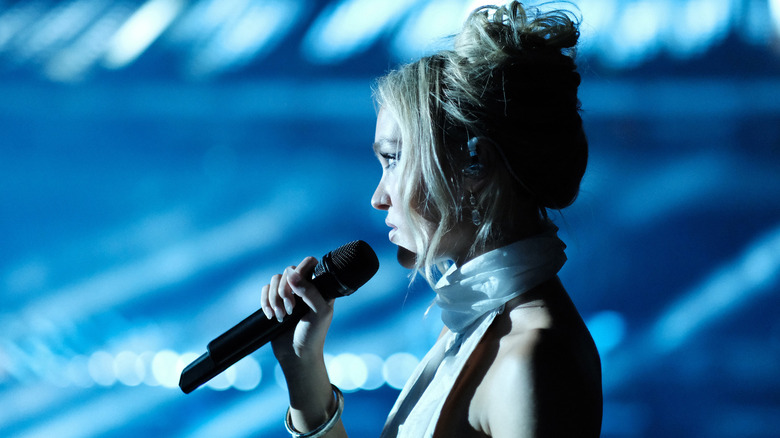The Ending Of The Idol Season 1 Explained
The following article includes discussions of domestic abuse, trauma, and sexual assault.
Love it or hate it (and we've seen just how overwhelming the latter response has been), HBO's explicit drama "The Idol" has become the summer's most talked-about series, going viral for its uncomfortable sex scenes, questionable acting, and poor handling of sensitive subject matter after a public creative overhaul. The backlash first began with a slew of negative reviews following the series premiere at the 76th Cannes Film Festival, setting expectations for the series' official release. Audiences were just as unforgiving, with an average audience score of 41% on Rotten Tomatoes.
Created by Sam Levinson ("Euphoria") and Abel Tesfaye (also known as The Weeknd), "The Idol" offers a peek behind the curtain of the tumultuous and toxic inner workings of the music industry. When aspiring pop star Jocelyn (Lily-Rose Depp) first meets club owner and cult leader Tedros (Tesfaye) in the pilot "Pop Tarts & Rat Tales," the two quickly fall into an abusive relationship where Tedros uses his influence to take advantage of the troubled star. Throughout the five-episode run, viewers are exposed to the extent of Tedros' abusive behavior as he gains more control over Jocelyn and her career — this is, until the Season 1 finale, when Jocelyn seemingly escapes his hold only to reveal that she was the manipulator the whole time, stringing Tedros along and stealing his entourage right from under his nose while ruining his career in the process. You may be wondering how we got to this femme fatale-esque twist, so let's unpack "The Idol's" controversial and polarizing ending.
What you need to remember about the plot of The Idol
We're introduced to Jocelyn during a difficult period in her life. After a public breakdown following the death of her mother, the pop idol is preparing for her comeback, orchestrated by her extensive team of professionals. The only problem is Jocelyn feels she doesn't have much say over her team's direction, causing her already-rocky mental state to worsen. When Jocelyn meets Tedros during a night out planned by her backup dancer Dyanne (Jennie Kim), she entrusts him with helping her rediscover her artistic expression through sexual BDSM practices and controlling advances.
Against the wishes of her best friend and assistant, Leia (Rachel Sennott), Tedros moves into Jocelyn's home, bringing his entourage of cult followers with him. During a dinner with the group, Jocelyn reveals the abuse she suffered at the hand of her mother, while Tedros encourages her to use her trauma in her art. Meanwhile, Jocelyn's team, becoming increasingly concerned for her career and well-being, looks into Tedros' past and finds a series of domestic abuse charges against him.
Jocelyn continues to look past Tedros' red flags until she finds out Dyanne is working with Tedros to actively steal one of Jocelyn's singles for a record deal with her label. To get back at Tedros, Jocelyn sleeps with her ex-boyfriend Rob (Karl Glusman) while Tedros listens from the other room. From there, Jocelyn and Tedros' dynamic falls apart, and Jocelyn gets the upper hand, kicking him out and taking his followers on tour with her.
If you or someone you know is dealing with domestic abuse, you can call the National Domestic Violence Hotline at 1−800−799−7233. You can also find more information, resources, and support at their website.
What happened at the end of The Idol?
In the Season 1 finale, "Jocelyn Forever," Tedros meets his downfall. During a meeting with her record label, Jocelyn performs alongside Tedros' followers, proving she's finally found her voice again while showcasing new talent. Impressed with everyone's performances, the record label allows Jocelyn to bring Ramsey (musician Ramsey), Chloe (Suzanna Son), Izaak (Moses Sumney), and Xander (Troye Sivan) on tour as her openers, putting Jocelyn in a position as the cult's new leader. During the meeting, it's also revealed to Jocelyn that Rob has been accused of sexual assault. Knowing that Tedros is behind the false allegations, Jocelyn demands Tedros be forcibly removed from her home.
To keep Tedros away for good, Jocelyn's team recruits a journalist to expose Tedros for his crimes and behavior, causing him to lose everything. Six weeks later, Jocelyn, finally free from Tedros, is kicking off her world tour at the SoFi Stadium. However, on the night of the show, Tedros is provided with an artist pass and is greeted by Jocelyn backstage. In her dressing room, Tedros finds the hairbrush Jocelyn claimed her mother beat her with. "It's brand new," he realizes. Jocelyn responds with a knowing smirk, cementing the role reversal of the manipulated becoming the manipulator.
On stage, Jocelyn introduces Tedros as the love of her life and the man who pulled her through the darkest hour. They share a passionate kiss in front of thousands of adoring fans while Jocelyn's team looks on in horror. Jocelyn then whispers something only the two of them can hear: "You're mine, forever. Now go stand over there." While Jocelyn takes in the roaring applause, the credits roll.
If you or anyone you know has been a victim of sexual assault, help is available. Visit the Rape, Abuse & Incest National Network website or contact RAINN's National Helpline at 1-800-656-HOPE (4673).
Reversed power dynamics
Season 1's ending subverts expectations and rewrites the dynamic between Jocelyn and Tedros. Since the beginning, Tedros is painted as the one in control of Jocelyn — arranging their meeting through Dyanne, completely overhauling her music, and blatantly coercing her into sexual acts. However, by Episode 4, Tedros' influence slowly begins to wane as Jocelyn discovers the sheer scope of his manipulative ways. The final two scenes in the dressing room and on stage reveal how the two used each other — Tedros using Jocelyn to initiate her into his cult of talented musicians and Jocelyn using Tedros as her personal muse to crawl out of her creative rut. But in the end, Jocelyn comes out on top and asserts her power over him.
A few questions have been circulating online regarding the twist ending: Wouldn't Tedros have noticed the hairbrush was new when he beat Jocelyn with it during a bondage session in Episode 3? Why did Xander go along with the story of abuse, claiming witness? Tedros' reputation has been publically ruined at the hands of Jocelyn and her team, so wouldn't it be bad publicity for Jocelyn to announce a known serial pimp and abuser as her lover? Perhaps this is why her team is freaking out on the sidelines, watching it all unfold.
As if escaping her situation wasn't enough of a victory for Jocelyn, she's painted as the real villain and Tedros as the victim. It could be that this twist would've benefited from the "female perspective" Abel Tesfaye claimed there was too much of before Amy Seimetz's departure as director, according to Deadline.
What about the others?
Although Jocelyn and Tedros take center stage throughout the series and in the season finale, we've also grown attached to some key players within their orbit who have all either gained something or suffered from the pair's consequences. Three of Tedros' most prominent followers — Ramsey, Chloe, and Izaak — find a new leader in Jocelyn when she offers the trio to open her world tour. The opportunity is a no-brainer and much more promising than what Tedros could ever offer them. Xander also joins the opening act after finally finding the confidence to sing again after alleging that Jocelyn's mom once outed him as gay and made him sign a contract never to pursue a music career, supposedly to keep the competition slim for Jocelyn. But viewers weren't so quick to cheer for Xander's comeback, considering he helped Tedros get away with ruining Rob's life with the incriminating photo he took of him and his false victim.
Unlike the others, Leia has had enough of Jocelyn's antics and ultimately decides to distance herself from the toxicity — a character choice that very much fits into the archetype of Lexi from "Euphoria." It seems Sam Levinson is adamant about keeping a good girl next door around to balance out the rest of the chaos. As for Dyanne, her plans to sideswipe Jocelyn in an attempt to kickstart her own career fall through when Jocelyn catches wind of her plans. Her meek final scene ends with a less-than-dramatic realization that "it was Jocelyn, wasn't it?"
The dark side of stardom
Abel Tesfaye and Sam Levinson went into "The Idol" with one goal in mind: to spark conversation around and critique the dark side of stardom. "I wanted to make a dark, twisted fantasy about the music industry," Tesfaye said during the Cannes press conference (via Variety). "To take everything I know about it and heighten it." In many ways, the series does just that. It shows how the music industry is a business that fosters an environment for abuse and manipulation. It hypersexualizes women artists while scrutinizing them at the same time. Artists are pushed into a machine that recreates carbon-copy money-makers. We see just how quickly the record label is ready to abandon Jocelyn and replace her with Dyanne when Jocelyn's human qualities of grief and trauma get in the way of her performance.
This fear of being replaced and forgotten in the blink of an eye exposes a vulnerability that people like Tedros can sense from a mile away. Jocelyn and the rest of his followers looked to him for validation when they weren't getting it from their immediate circle, leaving them exposed to his dangerous behavior. We've seen multiple real-life celebrities go down similar paths. Britney Spears comes to mind, and although, in recent years, she's been exonerated for public and media mistreatment of her with the viral hashtag #FreeBritney, it's hard to forget the overwhelming tabloid scrutiny she faced in the late-2000s. "The Idol" isn't explicitly based on Spears' experience, but it goes to show how common instances like these are in the music industry, even when they aren't as heavily publicized.
Exposing the absurdities of the music industry
In addition to calling out the evils of the industry, "The Idol" makes an effort to highlight the comedic elements by poking fun at celebrity culture. "The thing about the show is that it's dark, but you also don't want it to take itself too seriously," Abel Tesfaye told Complex. "There needs to be some fun. And I think the comedy end is very important there." The humor comes from the absurdity and morbidity of the situations Jocelyn and Tedros find themselves in. They're not jokes per se, and it's not everyone's cup of tea — a recurring sentiment expressed by the cast and crew that's been applied to every aspect of the series.
Besides Tedros being a walking joke of a man, most of the comedy comes from exposing the industry at large. In the pilot, Jocelyn's team tries to find a way to work around her personal crisis, exclaiming, "Mental illness is sexy!" The comment seems far-fetched when you first hear it, but like with anything that's a hot topic of discourse, someone will always find a way to capitalize off of it — even something as serious as mental illness. In the season finale, we get a comical juxtaposition during the record label meeting of Jocelyn actively trying to get rid of Tedros from her life while Xander and the others joyfully sing and dance in the background. Maybe it's not a stretch to equate the scene to a fandom's obliviousness to a celebrity's personal struggles. The world goes on singing and dancing while the source of the music is depleted by the industry that propped her up.
If you or someone you know needs help with mental health, please contact the Crisis Text Line by texting HOME to 741741, call the National Alliance on Mental Illness helpline at 1-800-950-NAMI (6264), or visit the National Institute of Mental Health website.
How trauma plays into art
When we first meet Jocelyn in the pilot, she's recovering from her breakdown following her mother's death, yet she's still in the thick of a creative crisis. Instead of trusting Jocelyn to pave her own path back to the spotlight, her team heavily controls her every move. When she meets Tedros, she sees something promising in him, much like the other followers he's already accumulated. Her transition from one controlling group to another showcases her submissive attitude. The only difference between Tedros and her team is that they may have her well-being and interests in mind considering their careers are tied to hers.
The twist that Jocelyn was the one making power moves the whole time can feel jarring after the show spent four episodes depicting her as a victim. Ultimately, Jocelyn knew Tedros was bad news from the beginning, yet she submitted to him anyway, hoping to find some creative inspiration from the situation. Her intention was always to seek out more trauma, as the notion that great art comes from great pain is so prevalent throughout any artistic industry. "All that trauma, you're gonna turn it into inspiration," Tedros tells Jocelyn. "You're gonna tap into it, you're gonna feel it, you're gonna face it, you're gonna remember it, and you're gonna let it wash all over."
What have the cast and crew of The Idol said about the ending?
Following the credits, Max featured a "Crafting the Finale" segment of the cast and crew discussing the twist that took everyone by surprise. "I think a lot of the audience will watch maybe the first few episodes and think that this guy is taking advantage of her," Lily-Rose Depp said in the segment. "By the end, he realizes that she knows exactly what he's doing, and she knows exactly what she's doing." She continues by saying, "Jocelyn is a very calculated and strategic person. She knows exactly what she wants, and she'll stop at nothing to get it. Tedros was her muse, and [she] got what she needed out of him."
Sam Levinson chimed in with his own insight, saying, "Throughout the season, Jocelyn has been searching for inspiration. She's looking to go to an uncomfortable place, and it's just ultimately looking for that next song, that next album. Tedros becomes the conduit for that creative unlocking." On Twitter, Abel Tesfaye shared a sentimental message, writing, "Continue to push the vision no matter how bumpy the journey."
During "The Idol's" constant controversies, Levinson, Tesfaye, and Depp have all defended and praised the series, claiming everything they've been called out for has been completely intentional. "When you have a character who has a strong sense of self and a strong sexual self, you end up underestimating her," Levinson explained during Cannes, according to Time. Depp echoed Levinson's sentiment, telling Vogue Australia, "I was never interested in making something puritanical. It's okay if this show isn't for everyone and that's fine — I think all the best art is [polarizing]."
Will there be a Season 2?
A week before the season finale premiered, a sort of Mandela effect overtook the internet when everyone came to the realization that "The Idol" Season 1 would end after five episodes instead of the originally reported six. Although it seemed like new news, it wasn't. Ahead of the Cannes premiere, it was reported that the season would only be five episodes long, but it seems everyone missed the memo. Rumors spread online that the nonexistent sixth episode was cut last minute due to the series' poor reception. This just isn't the case; rather, it was a conscious decision made when Sam Levinson took over for Amy Seimetz — a common occurrence in the film and TV industry.
So no, "The Idol" has not been canceled, but it hasn't been renewed either. Right now, the series sits in limbo as we wait for a confirmation from HBO. Those who worked on the series hold out hope, including Da'Vine Joy Randolph, who played Jocelyn's manager, Destiny, and told Variety, "I think that everyone's intention is to have a second season. This was never intended to be a limited series. Nothing is official, but HBO is quite happy." It'd be interesting to see how Jocelyn and Tedros' new dynamic unfolds in a second season. Now that Jocelyn has already gotten what she wanted, what could be next for her career?
